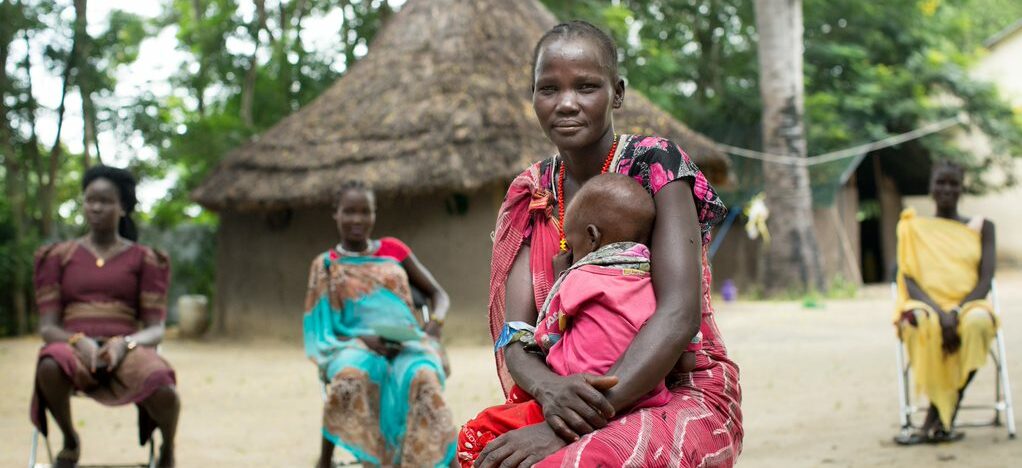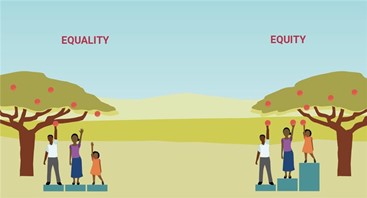Breaking Down Barriers to Health Equity Through Community Engagement
Published on June 11, 2021

MOMENTUM works with marginalized populations in some of the most demanding conditions around the world. Along with these situations, ongoing shocks and stresses such as the COVID-19 pandemic or political conflict often serve to highlight long-standing health inequities that persist within countries and worldwide.
Inequities can be exacerbated in lower-income areas without robust systems of health care. This may mean that essential health services do not reach many women and children most vulnerable to unfavorable changes to their environments. For example, over the past 30 years, maternal and newborn deaths have consistently been higher in low- and middle-income countries experiencing conflict than those with no conflict.1
Weakened governance and institutions, economic shocks, population displacements, and the effects of climate change, including disasters like drought and its effects across the landscape, worsen health inequities that affect women and children. Increased illness and death result from disruptions to essential health services and systems—from family planning and immunization to safe deliveries and medical supply chains—putting mothers and babies at risk for life-threatening complications.2
MOMENTUM programs support partner country public health priorities by addressing underlying poverty and weak social, economic, and health systems in fragile settings. Actions were taken to address equity to help strengthen health resilience, especially for the most impoverished families and those with female-headed households. Our approach helps to ensure that those with few economic resources and potentially marginalized groups, especially youth and those displaced by shocks, are included in the programming. This includes targeted outreach to these groups, focused provider training, quality of care improvements and client-centered services, and working with specific local groups and organizations.
MOMENTUM also focuses on addressing gender-based violence (GBV)—which limits health equity and equality—by working to transform restrictive social and gender norms that condone GBV, sexual harassment, and child marriage. Gender-based discrimination can prevent disadvantaged individuals and social groups from responding adequately to shocks and stresses.3 The resilient health systems that MOMENTUM helps to build afford women, girls, men, and boys the same status, rights, respect, resources, opportunities, and life choices.
 USAID describes health equity as “the notion that everyone should have a fair opportunity to reach his or her full health potential.” This includes the poorest, most disadvantaged, and stigmatized populations. Health inequities involve more than lack of equal access to resources; they involve inequalities that infringe on fairness and human rights.4
USAID describes health equity as “the notion that everyone should have a fair opportunity to reach his or her full health potential.” This includes the poorest, most disadvantaged, and stigmatized populations. Health inequities involve more than lack of equal access to resources; they involve inequalities that infringe on fairness and human rights.4
Health equality affords everyone equal enjoyment of care and services and rights, opportunities, and resources. Health equity is the process of being fair to persons across all levels of status and life situation. To ensure fairness, measures must be taken to offset historical and social limitations that prevent some from accessing care and services.
Working with Communities to Co-create a Healthy Future
South Sudan
Shocks and stresses can be exacerbated in areas where communities distrust health services because of past neglect, mistreatment, or poor perceptions of quality of care. To help increase trust, we are working to adapt and pilot existing approaches such as Save the Children’s “Partnership Defined Quality” model. This social accountability tool holds governments and health providers accountable to citizens and communities.5 The model’s guiding assumption is “equitable use of services should increase as the perceived quality, accessibility for all, and acceptability of those services increases.” Such tools aim to improve service quality and accessibility by creating a two-way dialogue between clients and health care providers, allowing more community involvement in determining how programs are defined, implemented, and monitored. Social accountability facilitates health resilience among communities, even when larger health systems are unreliable.
“MOMENTUM supports strategies to develop health equity that address specific needs and interests that compensate for historical and social disadvantages that prevent women, girls, youth, and other marginalized groups from otherwise accessing equal opportunities and enjoying equal rights.”
—Margaret Kasiko, MOMENTUM Gender and Youth Lead
Mali
In Mali’s northern regions of Gao and Timbuktu, MOMENTUM uses CARE’s “Community Score Card”6 as a social accountability tool to build awareness, understanding, trust, and communication between community members and health service providers.7 The Community Score Card and other social accountability and action planning steps help us help communities facilitate improved representation for marginalized groups such as women, youth, internally displaced persons, and persons with disabilities. This representation, in turn, helps to ensure the availability of MNCH/FP/RH health services that are responsive to marginalized groups’ particular needs and create a more equitable health system overall.
Evidence-based Actions to Ensure Continuity of Success
Moving forward, MOMENTUM will provide updates and lessons learned on what types of approaches worked and didn’t work in these fragile settings.
For example, MOMENTUM is conducting an assessment in South Sudan that focuses on understanding the role of social norms (the unspoken “rules” that predict social practices) in driving behaviors related to family planning use. We anticipate that the insights gained on social norms will help the country design better programming and promote locally appropriate and culturally sensitive messages.
Gender equity is part of our quality of care, supportive supervision, and clinical training via evidence-based health facility support. Our programs will expand opportunities for adolescent girls and young women to be healthy, active, productive, and resilient contributors and equal partners in their families and communities.
MOMENTUM Integrated Health Resilience works to improve access to high-quality, respectful, and person-centered maternal, newborn, and child health, voluntary family planning, and reproductive health care in fragile and conflict-affected settings. The project enhances coordination between development and humanitarian organizations and strengthens the resilience of individuals, families, and communities in partner countries.
References
- Akseer Nadia, James Wright, Hana Tasic, et al. 2020. “Women, Children and Adolescents in Conflict Countries: An Assessment of Inequalities in Intervention Coverage and Survival.” BMJ Global Health 5:e002214. https://gh.bmj.com/content/5/1/e002214.
- World Health Organization. 2019. “Maternal Mortality.” https://www.who.int/news-room/fact-sheets/detail/maternal-mortality.
- Oxfam International. 2016. “Women and the 1%: How Extreme Economic Inequality and Gender Inequality Must Be Tackled Together.” Briefing Summary, April 11. Note: The research referred to in comments on this topic is from Raghabendra Chattopadhyay and Esther Duflo. 2004. “Women as Policy Makers: Evidence from a Randomized Policy Experiment in India.” Econometrica 72(5):1409–1443.
- USAID Global Health News. January 2018: https://www.usaid.gov/global-health/global-health-newsletter/equity-in-health.
- Lovich, Ronnie, Marcie Rubardt, Debbie Fagan, and Mary Beth Powers. 2002. “The Partnership Defined Quality (PDQ): A toolbook for community and health provider collaboration for quality improvement.” Save the Children: United States. https://resourcecentre.savethechildren.net/library/partnership-defined-quality-pdq-toolbook-community-and-health-provider-collaboration-quality.
- CARE Malawi. 2013. “The Community Score Card (CSC): A generic guide for implementing CARE’s CSC process to improve quality of services.” Cooperative for Assistance and Relief Everywhere, Inc. https://www.care.org/app/uploads/2020/05/FP-2013-CARE_CommunityScoreCardToolkit.pdf.
- Hoffmann, K.D. The Role of Social Accountability in Improving Health Outcomes: Overview and Analysis of Selected International NGO Experiences to Advance the Field.” June 2014. Washington, DC: CORE Group. https://coregroup.org/resource-library/the-role-of-social-accountability-in-improving-health-outcomes-overview-and-analysis-of-selected-international-ngo-experiences-to-advance-the-field/

